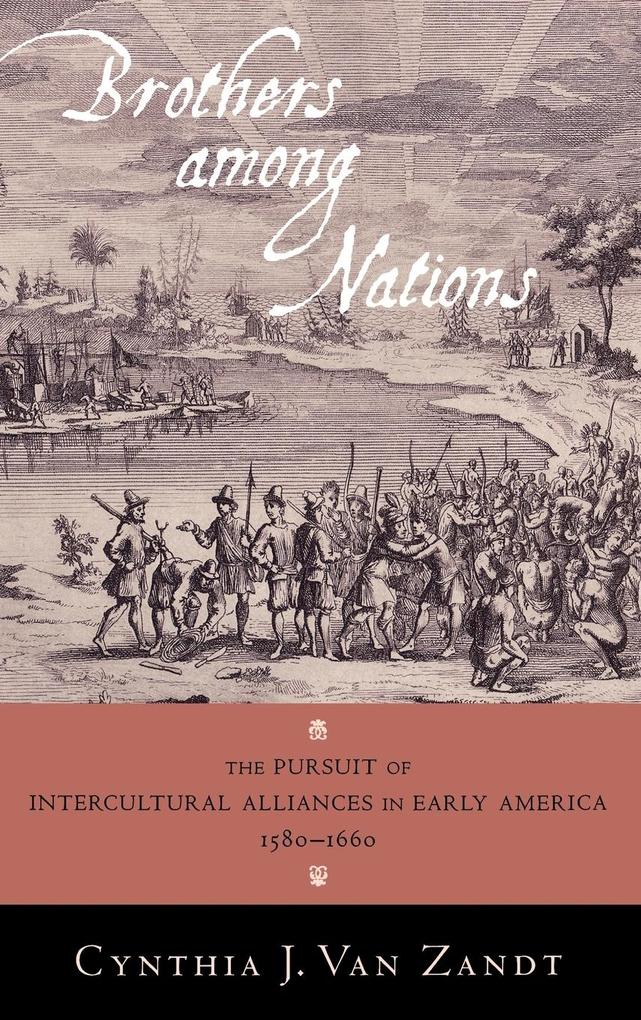Bücher versandkostenfrei*100 Tage RückgaberechtAbholung in der Wunschfiliale
Ihr Gutschein zum Schulstart: 15% Rabatt11 auf Kalender & Schreibwaren mit dem Code DATUM15
Jetzt einlösen
mehr erfahren
Zustellung: Sa, 20.09. - Do, 25.09.
Versand in 2 Wochen
VersandkostenfreiBestellen & in Filiale abholen:
Brothers Among Nations represents an effort to show how central Natives were to the European colonial project by demonstrating that the formation of alliances was the only way for the nascent colonies to succeed.
Inhaltsverzeichnis
- Prologue
- Introduction
- 1: Mapping the Peoples of the World: Geography, Chorography, and Intercultural Alliances
- 2: Laying the Groundwork for Alliances: Language, Maps, and Intercultural Suspicion
- 3: "You Called Him Father:" Fictive Kinship and Tributary Alliances in Tsennacomacah/Virginia
- 4: Alliance-Making and the Struggle for the Soul of Plymouth Colony
- 5: Captain Claiborne's Alliance
- 6: Alliances of Necessity: Fictive Kinship and Manhattan's Diaspora African Community
- 7: Nations Intertwined: Alliances and the Susquehannocks' Geography of North America
- Epilogue: Captain Claiborne's Lost Isle
- Notes
- Index
Produktdetails
Erscheinungsdatum
08. Juli 2008
Sprache
englisch
Seitenanzahl
264
Autor/Autorin
Cynthia Van Zandt
Verlag/Hersteller
Produktart
gebunden
Gewicht
562 g
Größe (L/B/H)
229/152/19 mm
ISBN
9780195181241
Entdecken Sie mehr
Pressestimmen
"Early intercultural encounters in North America have been encased in a nationalistic mythology that presents the colonizers as strong, confident, and culturally superior to the natives, who are portrayed as child-like, passive, and backward. With this book, Cynthia Van Zandt takes her place in a long line of historians who have labored to overturn that mythology by showing just how precarious early colonial ventures were."--Timothy J. Shannon, Virginia Magazine of History & Biography
"This highly original work shows us colonial America as we have rarely seen it before. Where other historians have found conflict among European, African, and Indian inhabitants, Cynthia Van Zandt reveals cooperation, accommodation, and alliance. Along the way, she introduces us to a cast of characters almost wholly unfamiliar to historians and conveys with admirable clarity the ethnic, religious, and cultural heterogeneity of these new colonial societies. Brothers among Nations furnishes a major new interpretation of the first decades of European settlement in North America, one sure to command a wide readership."--Alison Games, Georgetown University
"In clear, accessible prose, Cynthia Van Zandt reveals a lost world, a world in which far-flung alliances gave underlying unity to seemingly disconnected local events. No one who reads Brothers among Nationswill ever again see the interconnected histories of Virginia, New England, and New Netherland in quite the same way."--Daniel K. Richter, McNeil Center for Early American Studies, University of Pennsylvania
"Cynthia Van Zandt vividly brings to life the neglected careers of intercultural brokers. These newcomers, reaching out to Native America, forging alliances and even placing themselves under Indian protection, ensured the survival of the infant settlements.--Allan Greer, author of Mohawk Saint: Catherine Tekakwitha and the Jesuits
"By focusing on kinship--rhetorical as well as real--and the fluidity of bo
"This highly original work shows us colonial America as we have rarely seen it before. Where other historians have found conflict among European, African, and Indian inhabitants, Cynthia Van Zandt reveals cooperation, accommodation, and alliance. Along the way, she introduces us to a cast of characters almost wholly unfamiliar to historians and conveys with admirable clarity the ethnic, religious, and cultural heterogeneity of these new colonial societies. Brothers among Nations furnishes a major new interpretation of the first decades of European settlement in North America, one sure to command a wide readership."--Alison Games, Georgetown University
"In clear, accessible prose, Cynthia Van Zandt reveals a lost world, a world in which far-flung alliances gave underlying unity to seemingly disconnected local events. No one who reads Brothers among Nationswill ever again see the interconnected histories of Virginia, New England, and New Netherland in quite the same way."--Daniel K. Richter, McNeil Center for Early American Studies, University of Pennsylvania
"Cynthia Van Zandt vividly brings to life the neglected careers of intercultural brokers. These newcomers, reaching out to Native America, forging alliances and even placing themselves under Indian protection, ensured the survival of the infant settlements.--Allan Greer, author of Mohawk Saint: Catherine Tekakwitha and the Jesuits
"By focusing on kinship--rhetorical as well as real--and the fluidity of bo
Bewertungen
0 Bewertungen
Es wurden noch keine Bewertungen abgegeben. Schreiben Sie die erste Bewertung zu "Brothers Among Nations" und helfen Sie damit anderen bei der Kaufentscheidung.









